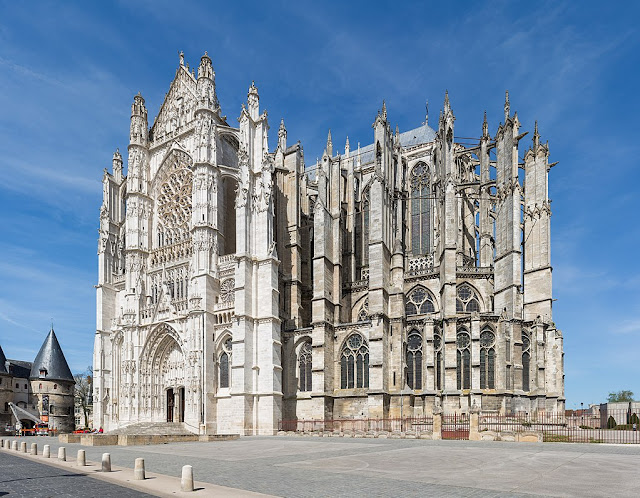Once the English army was north of the Seine, the pace of the campaign began to speed up.
Again it is not entirely clear exactly what Edward was intending to do. On the day that Edward arrived at Poissy, Sir Hugh Hastings and the Flemings had finally marched out of Ypres to attack Mervilles. By the time Edward had got his army over the Seine the Flemings had advanced as far as Béthune. The obvious move for Edward was to march north to link up with the Flemings, then turn to face the French army of King Philip.
However, Edward probably did not know where Hastings was, nor what he was doing. The territory between Béthune and Poissy was firmly in the control of the French. Armed men guarded all the bridges and key road junctions. The chances of a messenger getting through between Edward and Hastings were slim indeed, so slim that it is likely neither commander considered even sending one. Getting a message through by way of the sea was even more problematic. Grimaldi’s ships had been patrolling the Channel since the start of August. It seems that the last contact Edward had with English ships had been at Caen.
Of course, Edward knew that Hastings was supposed to be marching south by way of Béthune, but given the instability of the Flemish alliance it was by no means certain that he was. Certainly to risk the safety of an entire army on what somebody was meant to be doing would have been very dangerous.
The chronicler Jean le Bel states that when marching north from Poissy “his chief intention was to lay siege to the strong town of Calais”. This was written some years after the event and may have been a case of talking with hindsight, though it cannot be discounted entirely.
There is just one fact which indicates what Edward might have been planning. Before leaving Caen, he had sent orders back to England asking for supplies of bows, arrows, food and men to be sent to join him at Le Crotoy by the end of August.
Le Crotoy was a small port on the north shore of the estuary of the River Somme. That put it in Ponthieu, the small county which Edward had owned before the war began and which he had visited several times during the years of peace. When he gave these orders they may have been nothing more than a contingency plan. By 16 August, however, the rendezvous at Le Crotoy might have become critical.
Although Edward had got north of the Seine, his situation was still serious. The army’s food was running low, though starvation was still some way off. He was being dogged by a superior army, and as yet no place suitable for English tactics had yet been found. Just as Edward had probably considered using the rendezvous with the fleet at Caen to go home if things were going wrong, perhaps he now saw the meeting at Le Crotoy in a similar light.
Alternatively he may have been hoping for a sympathetic reception in Ponthieu. After all he knew and was friends with several of the local landowners and noblemen. Ponthieu might offer a haven in which to rest and resupply the army.
Whatever Edward’s aims were, they depended on staying ahead of the French army and on getting across the Somme. He had to march quickly.
On 18 August, the English reached the rich and prosperous city of Beauvais. The Prince of Wales thought he could take the city, and sent a messenger back to the king asking permission. Edward refused, telling his son that since the French were following it was no time to think of plunder. Despite this, some of the prince’s men did slip into the faubourgs and abbeys outside the walls to engage in some private looting. Twenty of these men had the misfortune to be leaving the Abbey of St Lucien as the king himself was riding past.
Stressed by the way the campaign was going and already peeved by his son’s behaviour, Edward was in no mood to be lenient. He ordered the men to be arrested and, as a tell tale trail of smoke showed that they had fired the abbey, he had them hanged on the spot. The bodies were left dangling from roadside trees past which the rest of the English army passed, making it very clear what would happen to those who disobeyed orders.
Photo : By Diliff - Own work, CC BY-SA 3.0, https://commons.wikimedia.org/w/index.php?curid=40041978



No comments:
Post a Comment